Business Law and Ethics: Report on Legal and Ethical Considerations
VerifiedAdded on 2023/01/12
|7
|2042
|49
Report
AI Summary
This report delves into the core principles of business law and ethics, examining the roles of the executive, judiciary, and legislature within a government framework. It explores the concept of specific performance in contract law, including limitations imposed by courts, and contrasts general partnerships with companies, focusing on separate legal personality and limited liability. The report also addresses the legal and ethical considerations surrounding the process of dismissing an employee. By analyzing relevant case laws and legal frameworks, the report offers insights into the practical application of business law and ethical decision-making in various scenarios. The report also mentions about the importance of law for the students and how to tackle the situations.
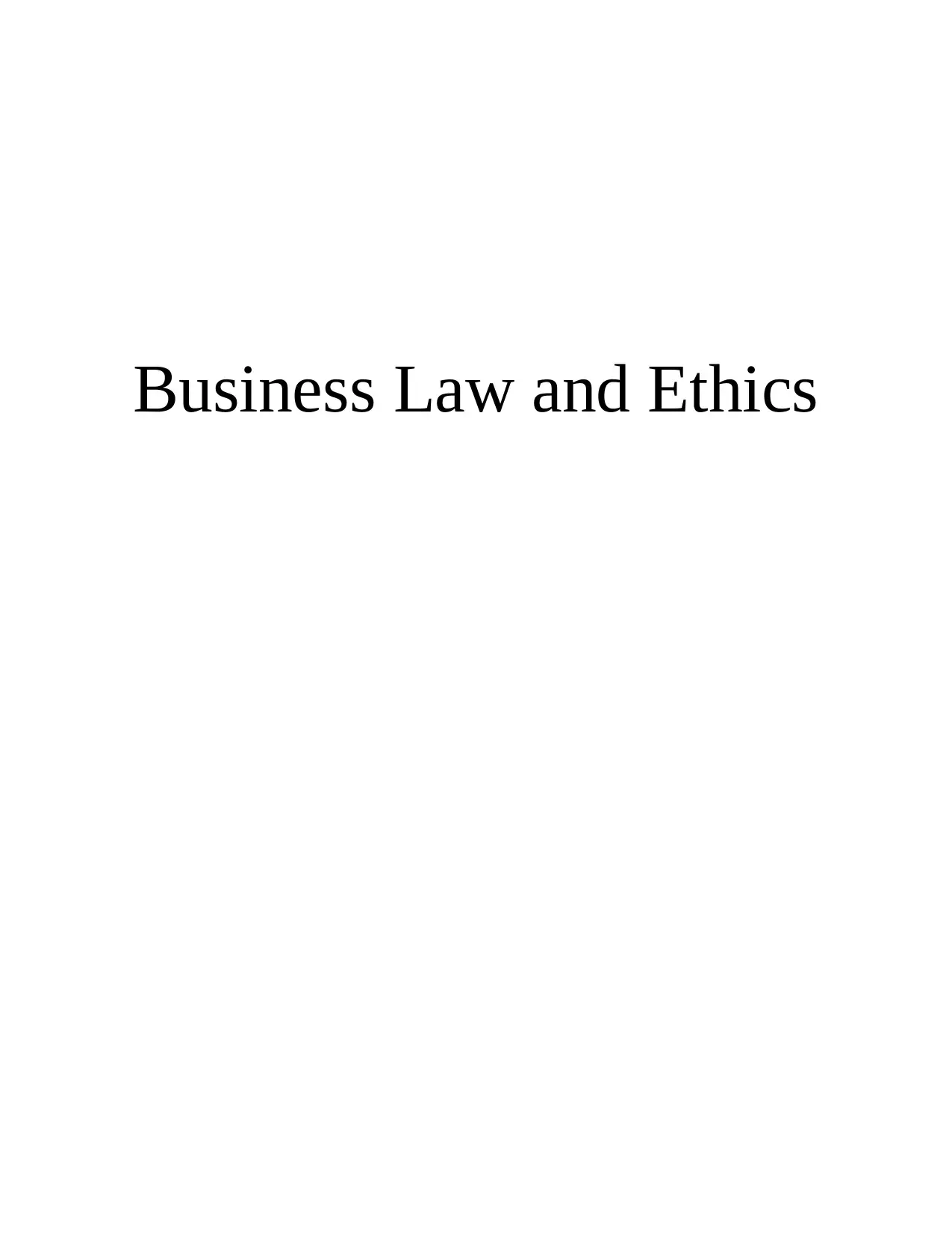
Business Law and Ethics
Paraphrase This Document
Need a fresh take? Get an instant paraphrase of this document with our AI Paraphraser
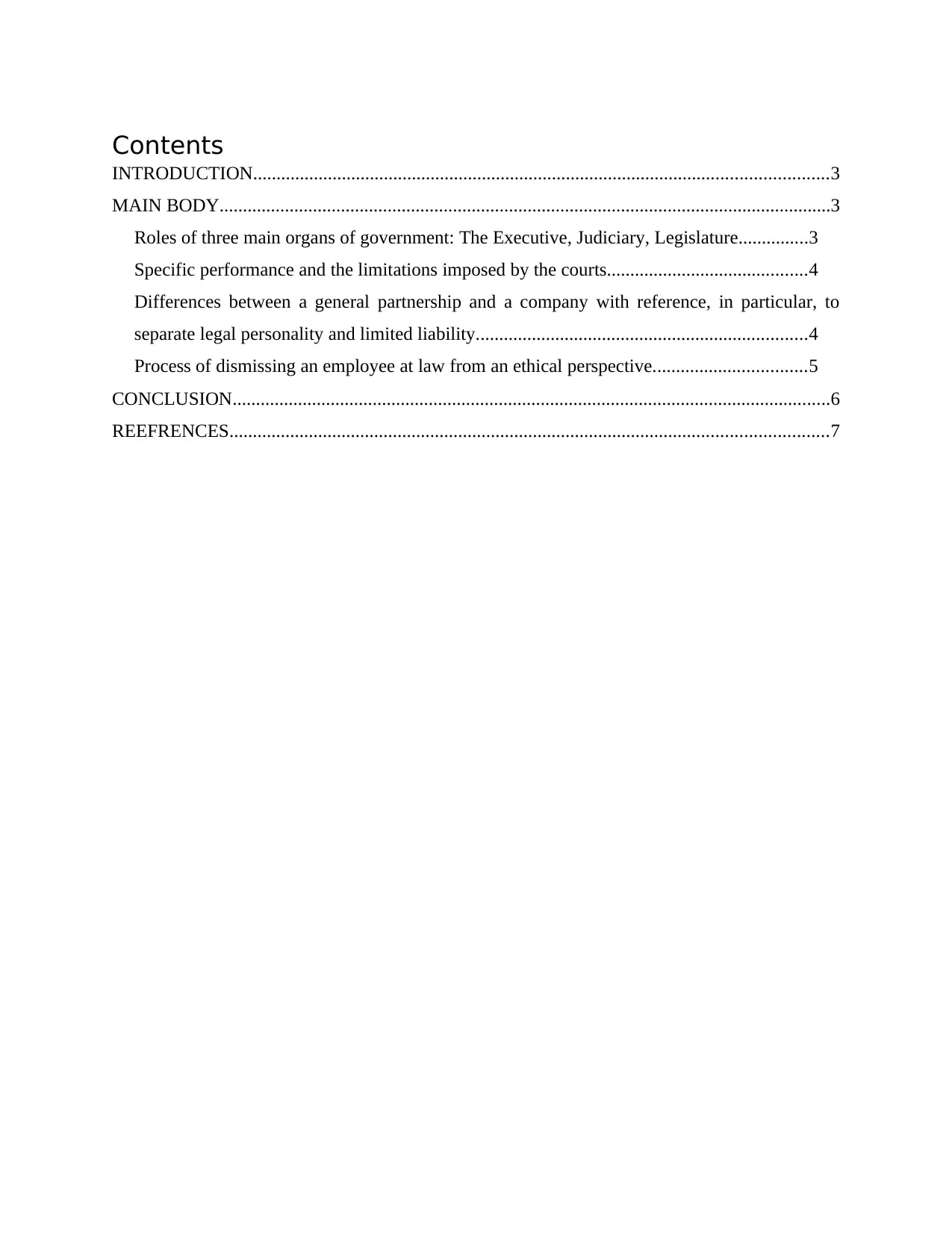
Contents
INTRODUCTION...........................................................................................................................3
MAIN BODY...................................................................................................................................3
Roles of three main organs of government: The Executive, Judiciary, Legislature...............3
Specific performance and the limitations imposed by the courts...........................................4
Differences between a general partnership and a company with reference, in particular, to
separate legal personality and limited liability.......................................................................4
Process of dismissing an employee at law from an ethical perspective.................................5
CONCLUSION................................................................................................................................6
REEFRENCES................................................................................................................................7
INTRODUCTION...........................................................................................................................3
MAIN BODY...................................................................................................................................3
Roles of three main organs of government: The Executive, Judiciary, Legislature...............3
Specific performance and the limitations imposed by the courts...........................................4
Differences between a general partnership and a company with reference, in particular, to
separate legal personality and limited liability.......................................................................4
Process of dismissing an employee at law from an ethical perspective.................................5
CONCLUSION................................................................................................................................6
REEFRENCES................................................................................................................................7
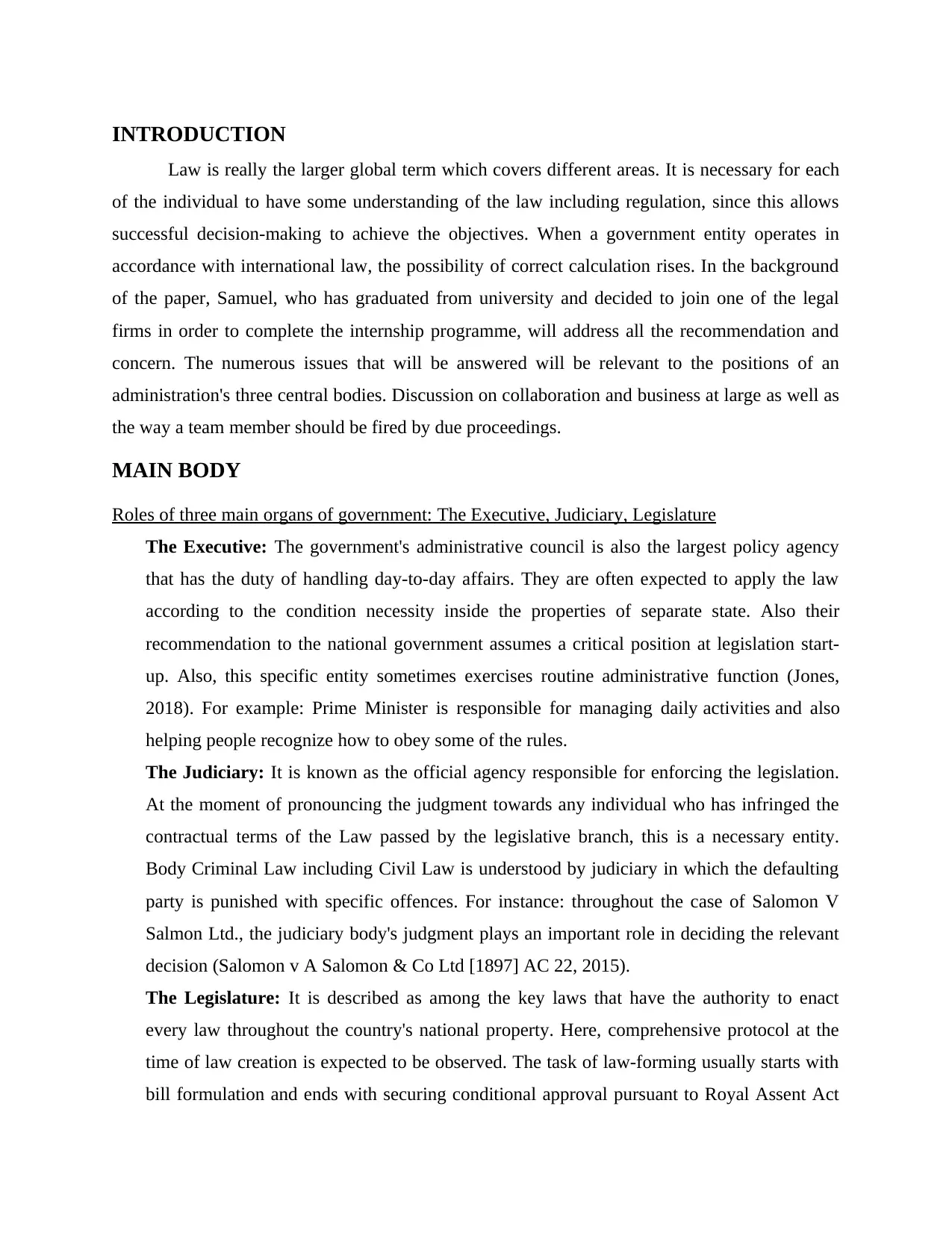
INTRODUCTION
Law is really the larger global term which covers different areas. It is necessary for each
of the individual to have some understanding of the law including regulation, since this allows
successful decision-making to achieve the objectives. When a government entity operates in
accordance with international law, the possibility of correct calculation rises. In the background
of the paper, Samuel, who has graduated from university and decided to join one of the legal
firms in order to complete the internship programme, will address all the recommendation and
concern. The numerous issues that will be answered will be relevant to the positions of an
administration's three central bodies. Discussion on collaboration and business at large as well as
the way a team member should be fired by due proceedings.
MAIN BODY
Roles of three main organs of government: The Executive, Judiciary, Legislature
The Executive: The government's administrative council is also the largest policy agency
that has the duty of handling day-to-day affairs. They are often expected to apply the law
according to the condition necessity inside the properties of separate state. Also their
recommendation to the national government assumes a critical position at legislation start-
up. Also, this specific entity sometimes exercises routine administrative function (Jones,
2018). For example: Prime Minister is responsible for managing daily activities and also
helping people recognize how to obey some of the rules.
The Judiciary: It is known as the official agency responsible for enforcing the legislation.
At the moment of pronouncing the judgment towards any individual who has infringed the
contractual terms of the Law passed by the legislative branch, this is a necessary entity.
Body Criminal Law including Civil Law is understood by judiciary in which the defaulting
party is punished with specific offences. For instance: throughout the case of Salomon V
Salmon Ltd., the judiciary body's judgment plays an important role in deciding the relevant
decision (Salomon v A Salomon & Co Ltd [1897] AC 22, 2015).
The Legislature: It is described as among the key laws that have the authority to enact
every law throughout the country's national property. Here, comprehensive protocol at the
time of law creation is expected to be observed. The task of law-forming usually starts with
bill formulation and ends with securing conditional approval pursuant to Royal Assent Act
Law is really the larger global term which covers different areas. It is necessary for each
of the individual to have some understanding of the law including regulation, since this allows
successful decision-making to achieve the objectives. When a government entity operates in
accordance with international law, the possibility of correct calculation rises. In the background
of the paper, Samuel, who has graduated from university and decided to join one of the legal
firms in order to complete the internship programme, will address all the recommendation and
concern. The numerous issues that will be answered will be relevant to the positions of an
administration's three central bodies. Discussion on collaboration and business at large as well as
the way a team member should be fired by due proceedings.
MAIN BODY
Roles of three main organs of government: The Executive, Judiciary, Legislature
The Executive: The government's administrative council is also the largest policy agency
that has the duty of handling day-to-day affairs. They are often expected to apply the law
according to the condition necessity inside the properties of separate state. Also their
recommendation to the national government assumes a critical position at legislation start-
up. Also, this specific entity sometimes exercises routine administrative function (Jones,
2018). For example: Prime Minister is responsible for managing daily activities and also
helping people recognize how to obey some of the rules.
The Judiciary: It is known as the official agency responsible for enforcing the legislation.
At the moment of pronouncing the judgment towards any individual who has infringed the
contractual terms of the Law passed by the legislative branch, this is a necessary entity.
Body Criminal Law including Civil Law is understood by judiciary in which the defaulting
party is punished with specific offences. For instance: throughout the case of Salomon V
Salmon Ltd., the judiciary body's judgment plays an important role in deciding the relevant
decision (Salomon v A Salomon & Co Ltd [1897] AC 22, 2015).
The Legislature: It is described as among the key laws that have the authority to enact
every law throughout the country's national property. Here, comprehensive protocol at the
time of law creation is expected to be observed. The task of law-forming usually starts with
bill formulation and ends with securing conditional approval pursuant to Royal Assent Act
⊘ This is a preview!⊘
Do you want full access?
Subscribe today to unlock all pages.

Trusted by 1+ million students worldwide
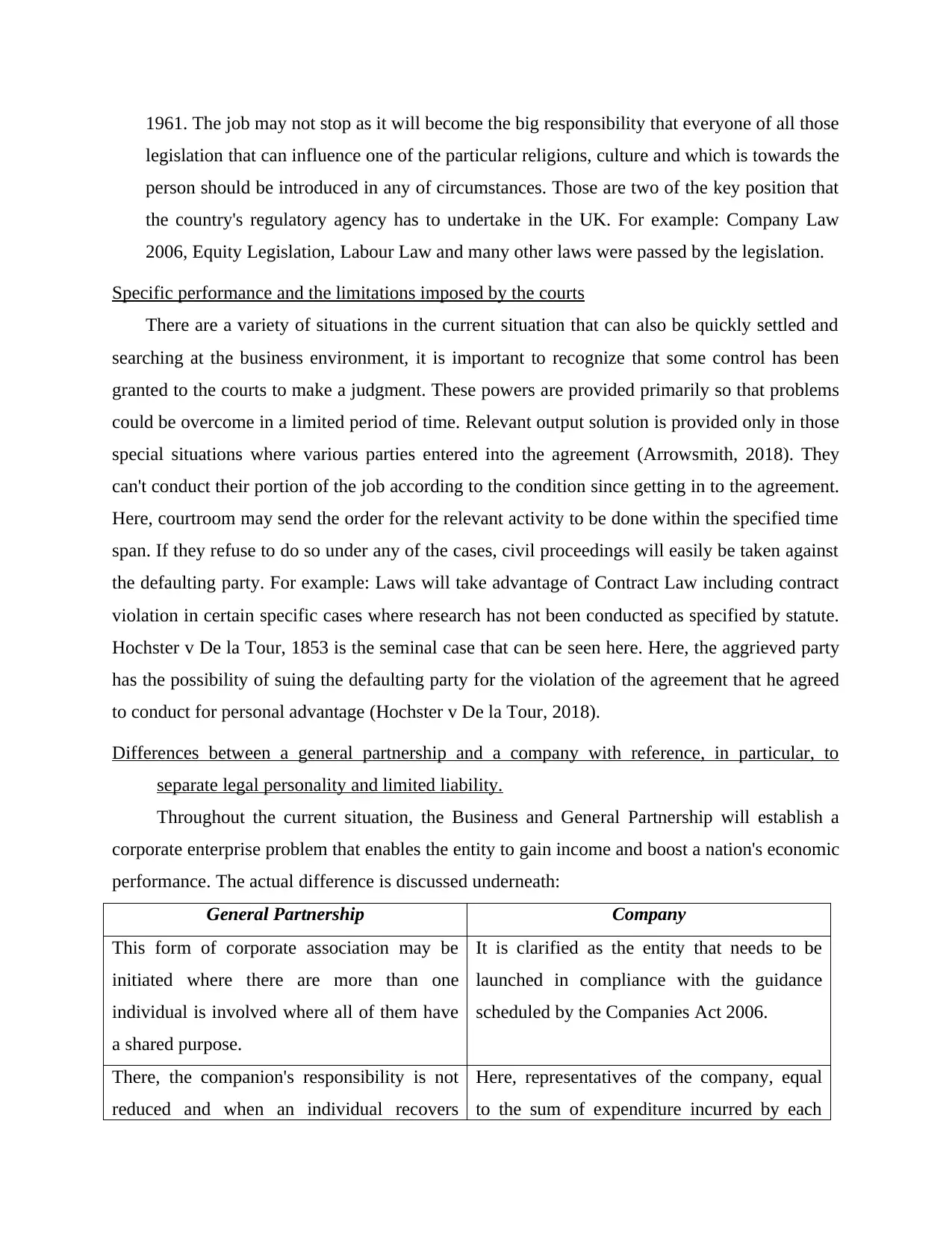
1961. The job may not stop as it will become the big responsibility that everyone of all those
legislation that can influence one of the particular religions, culture and which is towards the
person should be introduced in any of circumstances. Those are two of the key position that
the country's regulatory agency has to undertake in the UK. For example: Company Law
2006, Equity Legislation, Labour Law and many other laws were passed by the legislation.
Specific performance and the limitations imposed by the courts
There are a variety of situations in the current situation that can also be quickly settled and
searching at the business environment, it is important to recognize that some control has been
granted to the courts to make a judgment. These powers are provided primarily so that problems
could be overcome in a limited period of time. Relevant output solution is provided only in those
special situations where various parties entered into the agreement (Arrowsmith, 2018). They
can't conduct their portion of the job according to the condition since getting in to the agreement.
Here, courtroom may send the order for the relevant activity to be done within the specified time
span. If they refuse to do so under any of the cases, civil proceedings will easily be taken against
the defaulting party. For example: Laws will take advantage of Contract Law including contract
violation in certain specific cases where research has not been conducted as specified by statute.
Hochster v De la Tour, 1853 is the seminal case that can be seen here. Here, the aggrieved party
has the possibility of suing the defaulting party for the violation of the agreement that he agreed
to conduct for personal advantage (Hochster v De la Tour, 2018).
Differences between a general partnership and a company with reference, in particular, to
separate legal personality and limited liability.
Throughout the current situation, the Business and General Partnership will establish a
corporate enterprise problem that enables the entity to gain income and boost a nation's economic
performance. The actual difference is discussed underneath:
General Partnership Company
This form of corporate association may be
initiated where there are more than one
individual is involved where all of them have
a shared purpose.
It is clarified as the entity that needs to be
launched in compliance with the guidance
scheduled by the Companies Act 2006.
There, the companion's responsibility is not
reduced and when an individual recovers
Here, representatives of the company, equal
to the sum of expenditure incurred by each
legislation that can influence one of the particular religions, culture and which is towards the
person should be introduced in any of circumstances. Those are two of the key position that
the country's regulatory agency has to undertake in the UK. For example: Company Law
2006, Equity Legislation, Labour Law and many other laws were passed by the legislation.
Specific performance and the limitations imposed by the courts
There are a variety of situations in the current situation that can also be quickly settled and
searching at the business environment, it is important to recognize that some control has been
granted to the courts to make a judgment. These powers are provided primarily so that problems
could be overcome in a limited period of time. Relevant output solution is provided only in those
special situations where various parties entered into the agreement (Arrowsmith, 2018). They
can't conduct their portion of the job according to the condition since getting in to the agreement.
Here, courtroom may send the order for the relevant activity to be done within the specified time
span. If they refuse to do so under any of the cases, civil proceedings will easily be taken against
the defaulting party. For example: Laws will take advantage of Contract Law including contract
violation in certain specific cases where research has not been conducted as specified by statute.
Hochster v De la Tour, 1853 is the seminal case that can be seen here. Here, the aggrieved party
has the possibility of suing the defaulting party for the violation of the agreement that he agreed
to conduct for personal advantage (Hochster v De la Tour, 2018).
Differences between a general partnership and a company with reference, in particular, to
separate legal personality and limited liability.
Throughout the current situation, the Business and General Partnership will establish a
corporate enterprise problem that enables the entity to gain income and boost a nation's economic
performance. The actual difference is discussed underneath:
General Partnership Company
This form of corporate association may be
initiated where there are more than one
individual is involved where all of them have
a shared purpose.
It is clarified as the entity that needs to be
launched in compliance with the guidance
scheduled by the Companies Act 2006.
There, the companion's responsibility is not
reduced and when an individual recovers
Here, representatives of the company, equal
to the sum of expenditure incurred by each
Paraphrase This Document
Need a fresh take? Get an instant paraphrase of this document with our AI Paraphraser
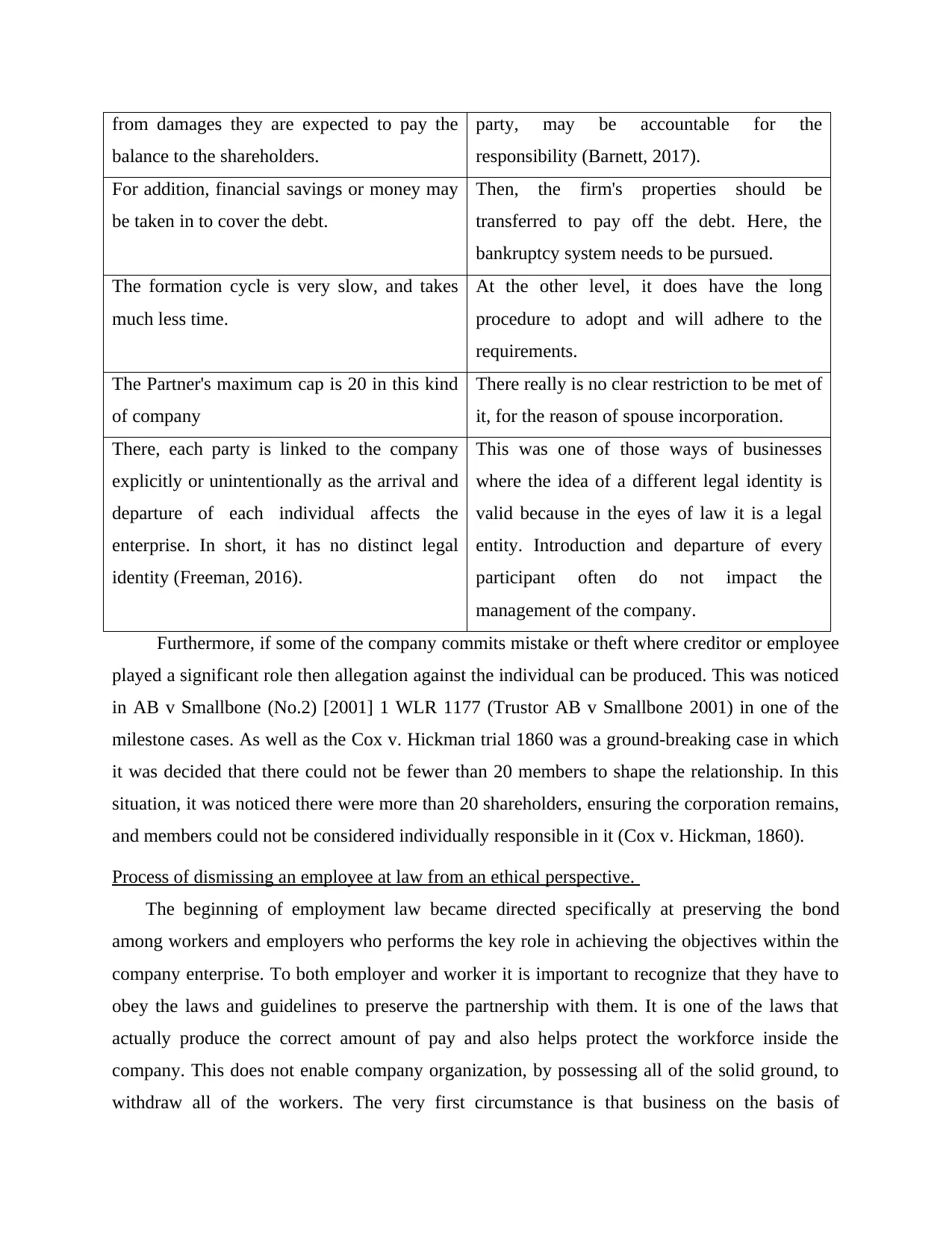
from damages they are expected to pay the
balance to the shareholders.
party, may be accountable for the
responsibility (Barnett, 2017).
For addition, financial savings or money may
be taken in to cover the debt.
Then, the firm's properties should be
transferred to pay off the debt. Here, the
bankruptcy system needs to be pursued.
The formation cycle is very slow, and takes
much less time.
At the other level, it does have the long
procedure to adopt and will adhere to the
requirements.
The Partner's maximum cap is 20 in this kind
of company
There really is no clear restriction to be met of
it, for the reason of spouse incorporation.
There, each party is linked to the company
explicitly or unintentionally as the arrival and
departure of each individual affects the
enterprise. In short, it has no distinct legal
identity (Freeman, 2016).
This was one of those ways of businesses
where the idea of a different legal identity is
valid because in the eyes of law it is a legal
entity. Introduction and departure of every
participant often do not impact the
management of the company.
Furthermore, if some of the company commits mistake or theft where creditor or employee
played a significant role then allegation against the individual can be produced. This was noticed
in AB v Smallbone (No.2) [2001] 1 WLR 1177 (Trustor AB v Smallbone 2001) in one of the
milestone cases. As well as the Cox v. Hickman trial 1860 was a ground-breaking case in which
it was decided that there could not be fewer than 20 members to shape the relationship. In this
situation, it was noticed there were more than 20 shareholders, ensuring the corporation remains,
and members could not be considered individually responsible in it (Cox v. Hickman, 1860).
Process of dismissing an employee at law from an ethical perspective.
The beginning of employment law became directed specifically at preserving the bond
among workers and employers who performs the key role in achieving the objectives within the
company enterprise. To both employer and worker it is important to recognize that they have to
obey the laws and guidelines to preserve the partnership with them. It is one of the laws that
actually produce the correct amount of pay and also helps protect the workforce inside the
company. This does not enable company organization, by possessing all of the solid ground, to
withdraw all of the workers. The very first circumstance is that business on the basis of
balance to the shareholders.
party, may be accountable for the
responsibility (Barnett, 2017).
For addition, financial savings or money may
be taken in to cover the debt.
Then, the firm's properties should be
transferred to pay off the debt. Here, the
bankruptcy system needs to be pursued.
The formation cycle is very slow, and takes
much less time.
At the other level, it does have the long
procedure to adopt and will adhere to the
requirements.
The Partner's maximum cap is 20 in this kind
of company
There really is no clear restriction to be met of
it, for the reason of spouse incorporation.
There, each party is linked to the company
explicitly or unintentionally as the arrival and
departure of each individual affects the
enterprise. In short, it has no distinct legal
identity (Freeman, 2016).
This was one of those ways of businesses
where the idea of a different legal identity is
valid because in the eyes of law it is a legal
entity. Introduction and departure of every
participant often do not impact the
management of the company.
Furthermore, if some of the company commits mistake or theft where creditor or employee
played a significant role then allegation against the individual can be produced. This was noticed
in AB v Smallbone (No.2) [2001] 1 WLR 1177 (Trustor AB v Smallbone 2001) in one of the
milestone cases. As well as the Cox v. Hickman trial 1860 was a ground-breaking case in which
it was decided that there could not be fewer than 20 members to shape the relationship. In this
situation, it was noticed there were more than 20 shareholders, ensuring the corporation remains,
and members could not be considered individually responsible in it (Cox v. Hickman, 1860).
Process of dismissing an employee at law from an ethical perspective.
The beginning of employment law became directed specifically at preserving the bond
among workers and employers who performs the key role in achieving the objectives within the
company enterprise. To both employer and worker it is important to recognize that they have to
obey the laws and guidelines to preserve the partnership with them. It is one of the laws that
actually produce the correct amount of pay and also helps protect the workforce inside the
company. This does not enable company organization, by possessing all of the solid ground, to
withdraw all of the workers. The very first circumstance is that business on the basis of
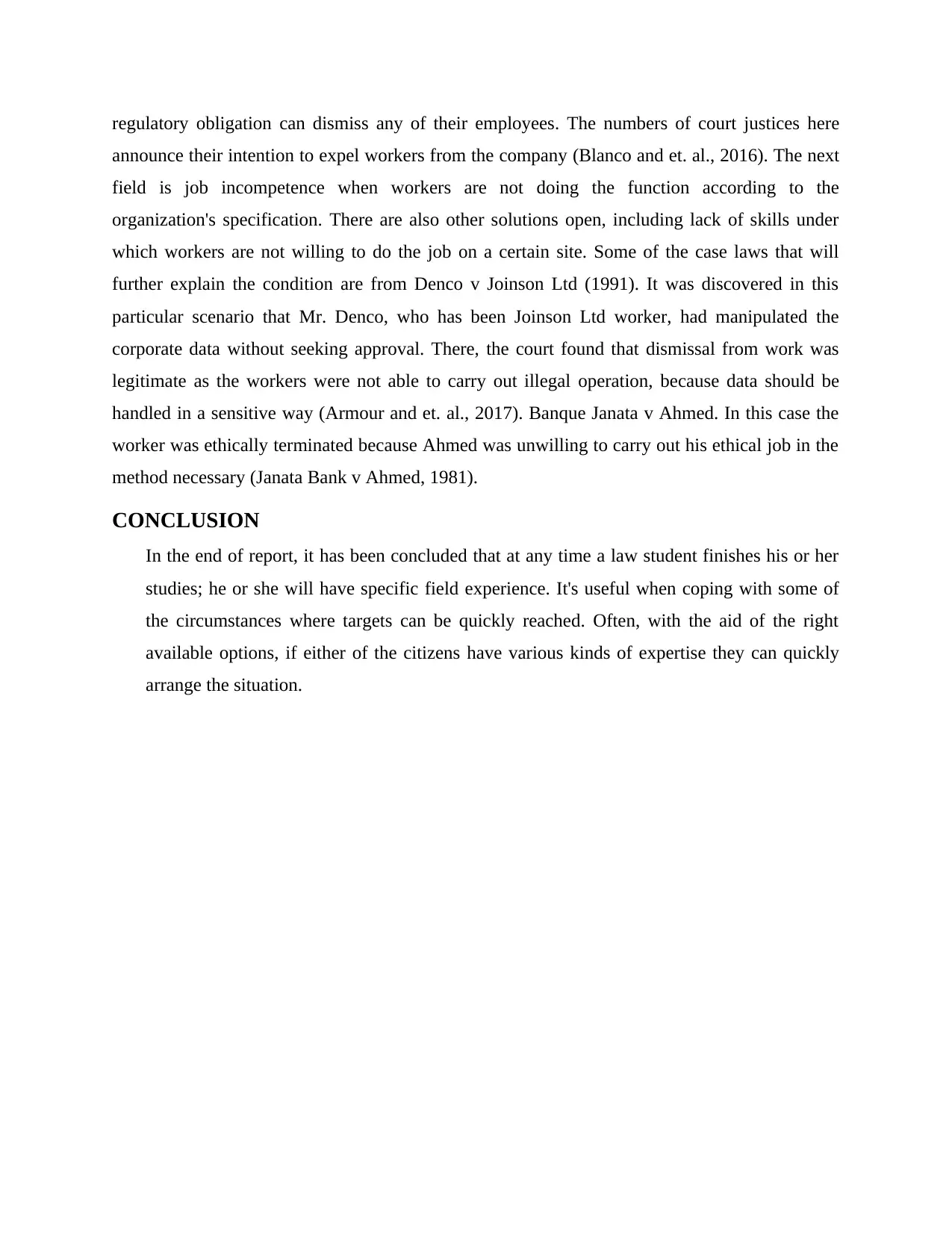
regulatory obligation can dismiss any of their employees. The numbers of court justices here
announce their intention to expel workers from the company (Blanco and et. al., 2016). The next
field is job incompetence when workers are not doing the function according to the
organization's specification. There are also other solutions open, including lack of skills under
which workers are not willing to do the job on a certain site. Some of the case laws that will
further explain the condition are from Denco v Joinson Ltd (1991). It was discovered in this
particular scenario that Mr. Denco, who has been Joinson Ltd worker, had manipulated the
corporate data without seeking approval. There, the court found that dismissal from work was
legitimate as the workers were not able to carry out illegal operation, because data should be
handled in a sensitive way (Armour and et. al., 2017). Banque Janata v Ahmed. In this case the
worker was ethically terminated because Ahmed was unwilling to carry out his ethical job in the
method necessary (Janata Bank v Ahmed, 1981).
CONCLUSION
In the end of report, it has been concluded that at any time a law student finishes his or her
studies; he or she will have specific field experience. It's useful when coping with some of
the circumstances where targets can be quickly reached. Often, with the aid of the right
available options, if either of the citizens have various kinds of expertise they can quickly
arrange the situation.
announce their intention to expel workers from the company (Blanco and et. al., 2016). The next
field is job incompetence when workers are not doing the function according to the
organization's specification. There are also other solutions open, including lack of skills under
which workers are not willing to do the job on a certain site. Some of the case laws that will
further explain the condition are from Denco v Joinson Ltd (1991). It was discovered in this
particular scenario that Mr. Denco, who has been Joinson Ltd worker, had manipulated the
corporate data without seeking approval. There, the court found that dismissal from work was
legitimate as the workers were not able to carry out illegal operation, because data should be
handled in a sensitive way (Armour and et. al., 2017). Banque Janata v Ahmed. In this case the
worker was ethically terminated because Ahmed was unwilling to carry out his ethical job in the
method necessary (Janata Bank v Ahmed, 1981).
CONCLUSION
In the end of report, it has been concluded that at any time a law student finishes his or her
studies; he or she will have specific field experience. It's useful when coping with some of
the circumstances where targets can be quickly reached. Often, with the aid of the right
available options, if either of the citizens have various kinds of expertise they can quickly
arrange the situation.
⊘ This is a preview!⊘
Do you want full access?
Subscribe today to unlock all pages.

Trusted by 1+ million students worldwide
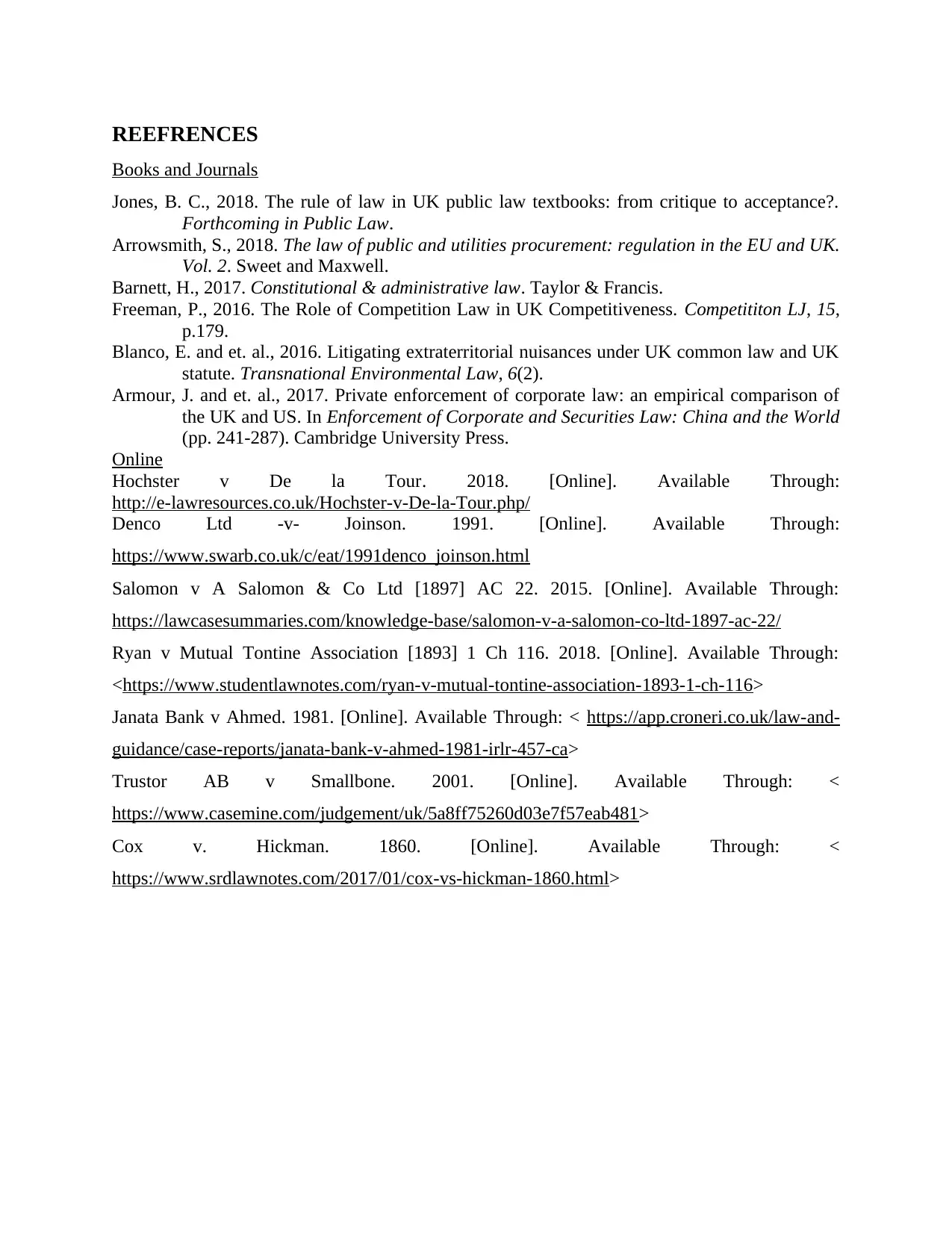
REEFRENCES
Books and Journals
Jones, B. C., 2018. The rule of law in UK public law textbooks: from critique to acceptance?.
Forthcoming in Public Law.
Arrowsmith, S., 2018. The law of public and utilities procurement: regulation in the EU and UK.
Vol. 2. Sweet and Maxwell.
Barnett, H., 2017. Constitutional & administrative law. Taylor & Francis.
Freeman, P., 2016. The Role of Competition Law in UK Competitiveness. Competititon LJ, 15,
p.179.
Blanco, E. and et. al., 2016. Litigating extraterritorial nuisances under UK common law and UK
statute. Transnational Environmental Law, 6(2).
Armour, J. and et. al., 2017. Private enforcement of corporate law: an empirical comparison of
the UK and US. In Enforcement of Corporate and Securities Law: China and the World
(pp. 241-287). Cambridge University Press.
Online
Hochster v De la Tour. 2018. [Online]. Available Through:
http://e-lawresources.co.uk/Hochster-v-De-la-Tour.php/
Denco Ltd -v- Joinson. 1991. [Online]. Available Through:
https://www.swarb.co.uk/c/eat/1991denco_joinson.html
Salomon v A Salomon & Co Ltd [1897] AC 22. 2015. [Online]. Available Through:
https://lawcasesummaries.com/knowledge-base/salomon-v-a-salomon-co-ltd-1897-ac-22/
Ryan v Mutual Tontine Association [1893] 1 Ch 116. 2018. [Online]. Available Through:
<https://www.studentlawnotes.com/ryan-v-mutual-tontine-association-1893-1-ch-116>
Janata Bank v Ahmed. 1981. [Online]. Available Through: < https://app.croneri.co.uk/law-and-
guidance/case-reports/janata-bank-v-ahmed-1981-irlr-457-ca>
Trustor AB v Smallbone. 2001. [Online]. Available Through: <
https://www.casemine.com/judgement/uk/5a8ff75260d03e7f57eab481>
Cox v. Hickman. 1860. [Online]. Available Through: <
https://www.srdlawnotes.com/2017/01/cox-vs-hickman-1860.html>
Books and Journals
Jones, B. C., 2018. The rule of law in UK public law textbooks: from critique to acceptance?.
Forthcoming in Public Law.
Arrowsmith, S., 2018. The law of public and utilities procurement: regulation in the EU and UK.
Vol. 2. Sweet and Maxwell.
Barnett, H., 2017. Constitutional & administrative law. Taylor & Francis.
Freeman, P., 2016. The Role of Competition Law in UK Competitiveness. Competititon LJ, 15,
p.179.
Blanco, E. and et. al., 2016. Litigating extraterritorial nuisances under UK common law and UK
statute. Transnational Environmental Law, 6(2).
Armour, J. and et. al., 2017. Private enforcement of corporate law: an empirical comparison of
the UK and US. In Enforcement of Corporate and Securities Law: China and the World
(pp. 241-287). Cambridge University Press.
Online
Hochster v De la Tour. 2018. [Online]. Available Through:
http://e-lawresources.co.uk/Hochster-v-De-la-Tour.php/
Denco Ltd -v- Joinson. 1991. [Online]. Available Through:
https://www.swarb.co.uk/c/eat/1991denco_joinson.html
Salomon v A Salomon & Co Ltd [1897] AC 22. 2015. [Online]. Available Through:
https://lawcasesummaries.com/knowledge-base/salomon-v-a-salomon-co-ltd-1897-ac-22/
Ryan v Mutual Tontine Association [1893] 1 Ch 116. 2018. [Online]. Available Through:
<https://www.studentlawnotes.com/ryan-v-mutual-tontine-association-1893-1-ch-116>
Janata Bank v Ahmed. 1981. [Online]. Available Through: < https://app.croneri.co.uk/law-and-
guidance/case-reports/janata-bank-v-ahmed-1981-irlr-457-ca>
Trustor AB v Smallbone. 2001. [Online]. Available Through: <
https://www.casemine.com/judgement/uk/5a8ff75260d03e7f57eab481>
Cox v. Hickman. 1860. [Online]. Available Through: <
https://www.srdlawnotes.com/2017/01/cox-vs-hickman-1860.html>
1 out of 7
Related Documents
Your All-in-One AI-Powered Toolkit for Academic Success.
+13062052269
info@desklib.com
Available 24*7 on WhatsApp / Email
![[object Object]](/_next/static/media/star-bottom.7253800d.svg)
Unlock your academic potential
Copyright © 2020–2025 A2Z Services. All Rights Reserved. Developed and managed by ZUCOL.




